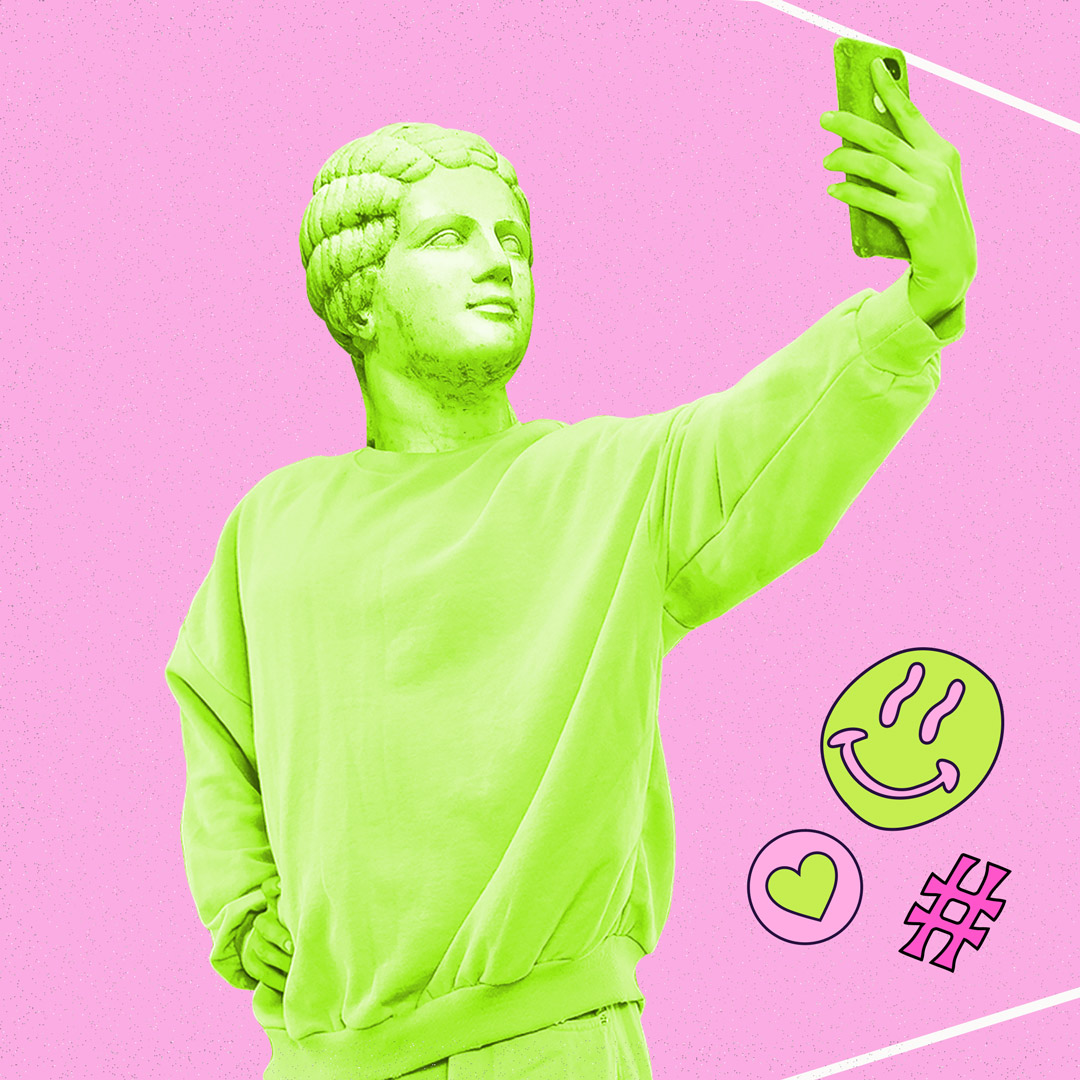
Happiness2.0
Social media use and well-being in adolescence
SNSF Rolling Agora project

Aim of the initiative
The Happiness2.0 project involved various science-based communication activities aimed at Ticino adolescents between the ages of 14 and 18, their parents and all interested parties.
At the centre of the initiative is the use of social media and its influence on adolescents' well-being over time. Some indicators of positive well-being (e.g. happiness) and developmental processes such as personality formation and the need for social connections were considered.
The three main activities of Happiness2.0 were: ‘HappyLab’ two weeks of workshops integrating the arts and science, with the participation of 20 classes of high school students. Both weeks were followed by a ‘HappyApero’, a public event for reflection and dialogue on the topic of digital well-being. The ‘HappyTable’ was held as a conclusion, a moment of discussion where the results of the project were presented to the stakeholders involved.
Project activities
HappyLab
The HappyLabs took place in April and September 2024, during two weeks of workshops lasting two hours each. Twenty high school classes from the canton of Ticino participated with around 400 students.
The workshops consisted of three parts:
- A scientific introduction on the topic of well-being and social media;
- A practical activity inspired by examples of creative literature on the role of ‘masks’ as symbols of the difference between a fictitious online identity and a real identity;
- The creation of a ‘Happiness2.0 Pyramid’ through the expression of the core values of each participant on three levels of importance.
HappyApero
At the end of each of the two weeks of HappyLab, a public event called HappyApero was organised. The aim of these meetings was to foster communication between adolescents, scientists and the adult public (including parents and teachers).
Each HappyApero involved an initial presentation of the project results by the experts, followed by a debate with the public and a special guest. An aperitif was organised at the end of the event as a further space for discussion.
HappyTable
The HappyTable, which took place on 25 February 2025, with the aim of summarising the activities of the Happiness2.0 project and presenting them to the stakeholders involved.
All the directors of secondary schools in Ticino, together with teachers, representatives of parents' associations and professionals working with teenagers in the region, were invited to participate in the discussion. The event was divided into two parts: the first part presented the results of the project, while in the second part the participants discussed future prospects and the next steps to be taken.
Project activities
HappyLab
The HappyLab includes two weeks (in Spring and Autumn 2024) of a 2-hour laboratory. It will be repeated twice per day, with one high school class (~ 20 students) invited per time, for a total of about 20 classes (~ 400 students in total).
It will include three parts:
- An introduction to communication concepts by a research expert;
- A practical activity inspired by creative literature examples on the role of “masks” as symbols of the difference between an online fictitious identity and a real identity. A debriefing with a mental health expert will follow;
- A reflection on what it means to be happy for them. Classical literature examples from Aristotle’s “The Nicomachean Ethics” will be read to define happiness (e.g., hedonic versus eudaimonic happiness). They will create a shared “Happiness2.0 Pyramid” (i.e., to define their happiness in the current state of the Internet, i.e. 2.0, including user-generated content via social media)
HappyApero
The HappyApero aims to foster communication between adolescents, scientists, and the adult public (including parents and teachers).
- A group of adolescents who participated in the HappyLab will be invited to share their experiences with other adolescents in a peer-to-peer interview format.
Adolescents will share their experiences with the adult public and ask questions to invited research experts.
HappyTable:
The HappyTable aims to summarize the Happiness2.0 project’s activities.In collaboration with the Culture Division, City of Lugano, we will invite all high school principals of Ticino, interested teachers, representatives from parental associations, and stakeholders working with adolescents in Ticino.
- We will deliver printed brochures with the project summary and we will promote the continuation of the HappyLab project for the following year, which will be based on the visual arts-in line with the IBSA Foundation's Culture and Health program.
Aim of the initiative
Happiness2.0 Lab includes a series of communication activities (HappyLab, HappyApero, and HappyTable) designed for adolescents, aiming at translating scientific results into practice, through the combination of science and arts.
Useful information
IBSA Foundation for Scientific Research, Lugano, Switzerland
In collaboration with:
USI, Università della Svizzera Italiana
IBSA Foundation for scientific research, Lugano, Switzerland
Dr. Silvia Misiti, IBSA Foundation for scientific research and Prof. Peter J. Schulz, USI Università della Svizzera italiana
Jacopo Crespi, IBSA Foundation for scientific research
Sara Comodo, IBSA Foundation for scientific research
Alessia Robbiani, USI Università della Svizzera Italiana
Pietro Bianchi, USI Università della Svizzera Italiana
Dario Gennari, Rete Operativa
Department of Education, Culture and Sport (DECS)
SIMS - Section of Middle and Higher Education
Parent Assembly, Lugano 1 High School
Equal Opportunity Service, USI
Cultural Division of the City of Lugano


